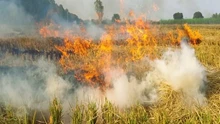
A groundbreaking study has revealed that the unprecedented global rise in greenhouse gases could drastically reduce rainfall in equatorial regions, leading to significant vegetation shifts. The findings suggest that India's biodiversity hotspots, including the evergreen forests of the Western Ghats, northeast India, and the Andaman Islands, may transition into deciduous forests.
The study, conducted by researchers from the Birbal Sahni Institute of Palaeosciences (BSIP), an autonomous institute under the Department of Science and Technology, draws parallels between past and potential future climate scenarios. Deep time hyperthermal events, such as the Eocene Thermal Maximum 2 (ETM-2), serve as analogs for understanding future climate patterns. However, most data on these events come from mid- and high-latitude regions, leaving a gap in quantitative data from equatorial and tropical areas.
To fill this gap, the BSIP researchers analyzed fossil pollen and carbon isotope data from the ETM-2 period, which occurred around 54 million years ago. During this time, the Indian plate was situated near the equator, providing a unique natural laboratory to study vegetation-climate interactions in equatorial regions.
The team selected the Panandhro Lignite Mine in Kutch, Gujarat, for fossil pollen collection due to the availability of ETM-2 fossils. Their analysis revealed that when atmospheric carbon dioxide concentrations exceeded 1000 ppmv, rainfall near the paleo-equator decreased significantly. This reduction in rainfall led to the expansion of deciduous forests at the expense of evergreen forests.
Published in the journal Geoscience Frontiers, the study raises critical concerns about the future of equatorial and tropical rainforests and biodiversity hotspots under increasing carbon emissions. The findings highlight the delicate balance between CO2 levels and the hydrological cycle, emphasizing the need for strategies to conserve these vital ecosystems in the face of climate change.
This research underscores the importance of understanding historical climate events to inform predictions and conservation efforts for the future, providing valuable insights into the potential impacts of continued greenhouse gas emissions on global biodiversity.













